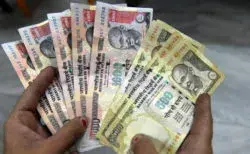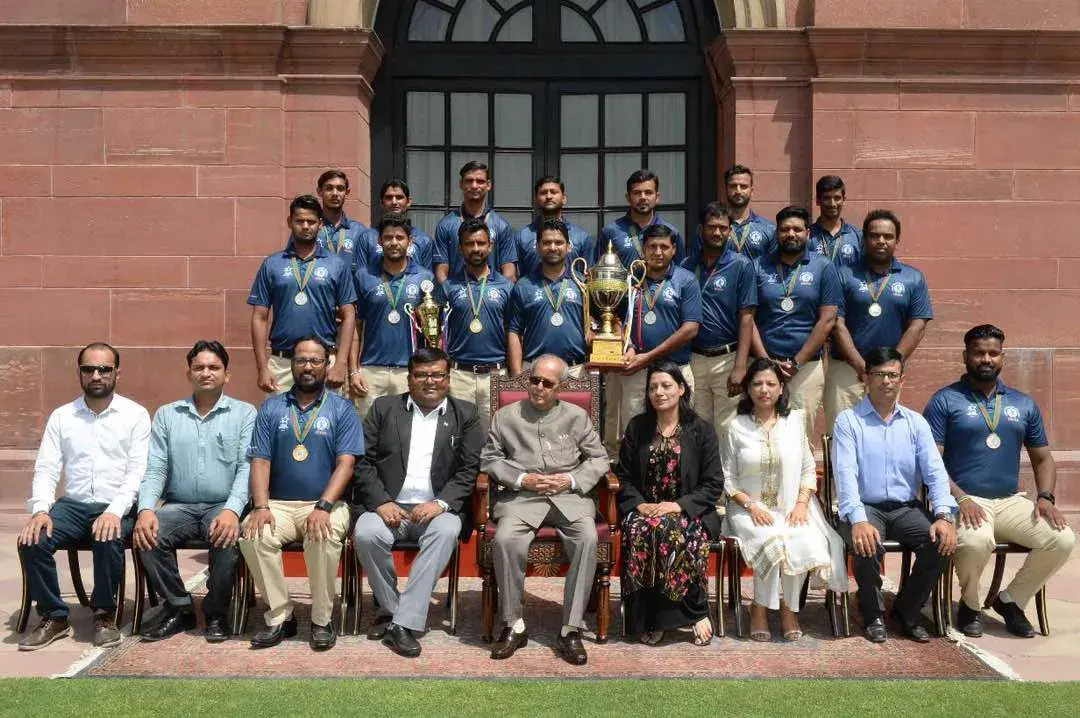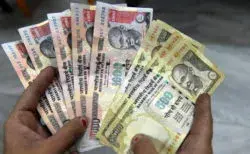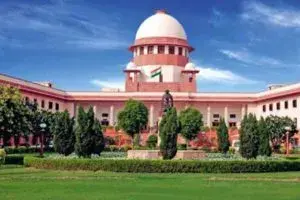India: Supreme Court bans sale and registration of BS- III vehicles from April 1
 In a writ petition, filed by renowned environmental activist M.C. Mehta, the Supreme Court of India on March 29, 2017, delivered a landmark judgment aimed at curbing vehicular pollution .The Court prohibited registration of vehicles meeting BS-III standards on and from April 1
In a writ petition, filed by renowned environmental activist M.C. Mehta, the Supreme Court of India on March 29, 2017, delivered a landmark judgment aimed at curbing vehicular pollution .The Court prohibited registration of vehicles meeting BS-III standards on and from April 1
Bombay Stock Exchange sets up new Corporate Announcement Filing System
 The Bombay Stock Exchange through its Circular DCS/COMP/24/2016-17 dated 27/02/2017 took a new step for real time disclosure and dissemination of information by corporates, by placing a new Corporate Announcement Filing System with effect from March 1, 2017.
The Bombay Stock Exchange through its Circular DCS/COMP/24/2016-17 dated 27/02/2017 took a new step for real time disclosure and dissemination of information by corporates, by placing a new Corporate Announcement Filing System with effect from March 1, 2017.
Mandatory Filing of Financial Results in XBRL Mode
 With the view of enhancing transparency and making disclosures of financial results more accurate, the Bombay Stock Exchange has made XBRL filing of financial results by listed entities mandatory.
With the view of enhancing transparency and making disclosures of financial results more accurate, the Bombay Stock Exchange has made XBRL filing of financial results by listed entities mandatory.
Disclosure of Specified Bank Notes
 In order to bring transparency, Ministry of Corporate Affairs vide notification dated March 30, 2017, has amended Schedule III of the Companies Act, 2013, which relates to instructions for preparation of Balance Sheet and Profit and Loss Statement of the company, as well as matters to be stated in Statutory Auditors Report.
In order to bring transparency, Ministry of Corporate Affairs vide notification dated March 30, 2017, has amended Schedule III of the Companies Act, 2013, which relates to instructions for preparation of Balance Sheet and Profit and Loss Statement of the company, as well as matters to be stated in Statutory Auditors Report.
Government throws light on The Maternity Benefit (Amendment) Act, 2017
The Ministry of Labour and Employment (hereinafter referred to as the “Ministry”) vide notification No. S-36012/03/2015-SS-I dated April 12, 2017 has clarified queries raised with regard to The Maternity Benefit (Amendment) Act, 2017(hereinafter referred to as the “Amendment Act”).
President Pranab Mukherjee meets India T20 Asia Cup winner Deaf Cricket Team
 President Pranab Mukherjee on Thursday April 20, 2017, met the members of the Indian Deaf Cricket Team which as recently as this month won the T20 Asia Cup for the Deaf, in Dhaka, Bangladesh.
President Pranab Mukherjee on Thursday April 20, 2017, met the members of the Indian Deaf Cricket Team which as recently as this month won the T20 Asia Cup for the Deaf, in Dhaka, Bangladesh.
India: Supreme Court bans sale and registration of BS- III vehicles from April 1

Source: Internet
Introduction:
Since the liberalization of the Indian Economy in 1991, the automobile sector has come a long way to a point where India is now one of the largest producers of automobiles in the world.
While it is certainly boosting the Indian economy by creating employment opportunities, improvement in mobility for huge population, at the same time, it quite literally has a darker side, i.e., vehicular pollution which is grown at an alarming rate. Air pollution from vehicles in urban areas, particularly in big cities, has become a serious threat and the same is evident through symptoms like cough, headache, nausea, irritation of eyes, heart diseases, various bronchial and visibility problems which are commonly observed in resident of such cities.
In a writ petition[1], filed by renowned environmental activist M.C. Mehta, the Supreme Court of India on March 29, 2017, delivered a landmark judgment aimed at curbing vehicular pollution. The Bench of Justice Madan B. Lokur and Deepak Gupta ordered-
“On and from April 1, 2017, such vehicles that are not BS-IV compliant shall not be sold in India by any manufacturer or dealer, that is to say that such vehicles, whether two-wheeler, three- wheeler, four-wheeler or commercial vehicles will not be sold,”
The court further prohibited registration of vehicles meeting BS-III standards on and from April 1 –
“All the vehicle registering authorities under the Motor Vehicles Act, 1988, are prohibited from registering such vehicles on and from April 1, 2017, that do not meet BS-IV emission standards, except on proof that such a vehicle has already been sold on or before March 31, 2017.”
Further, Bajaj Auto Limited prayed for the Court to order the Union of India and/or Environment Pollution Control Authority (hereinafter referred to as the ‘EPCA’) to issue communication to all vehicle manufacturers that on and after April 1, 2017, vehicles not complaint of BS IV would not be sold or registered across the country.
What are Bharat Stage norms?
Bharat Stage (BS) Emission Standards, introduced in 2000, are emission standards set up by the Central Government to regulate the output of air pollutants from internal combustion engine equipment, including motor vehicles. In 2003, National Auto Fuel Policy, based on the recommendations of Mashelkar Committee, was announced by Government of India which provided the roadmap for implementation of BS norms for vehicular emissions. The different norms are brought to life as per standard set up by the Central Pollution Control Board (hereinafter referred to as the ‘CPCB’).
Roadmap of BS norms in India
BS III norm was implemented in April 2005, in Delhi, Mumbai, Kolkata, Ahmedabad, Pune and Bengaluru. In April 2010, the norms were implemented nationwide with respect to all vehicles.
Initially, BS IV norm was implemented in April 2010 in the National Capital Region, Mumbai, Kolkata, Chennai, Bengaluru, and Hyderabad including Secunderabad, Ahmedabad, Pune, Surat, Kanpur, and Agra in four wheeled vehicles. In April 2017, the norm was implemented nationwide.
Impact of shifting from BS III to BS IV
As per the data collected by CPCB, shifting of BS norms from BS III to BS IV will bring significant reduction in emission of pollutants such as Carbon Monoxide from 2.3g/km to 1.0g/km, Hydrocarbons, Nitrogen Oxide from 0.35g/km to 0.18g/km etc[2].
According to an article titled, “Status of the Vehicular Pollution Control Programme in India” published by the CPCB, impact of emissions from automobiles leads to among others serious health issues[3]. A few such instances are –
- Exposure to Carbon Monoxide can prevent oxygen transfer and increase headaches/nausea. Exposure to Hydrocarbons can cause headaches, vomiting and disorientation.
- Long Term exposure of Nitrogen Oxide can cause Nose and eye irritation and damage lung tissue.
- PM is Particulate matter. Its exposure can harm the respiratory tract and reduce lung function.
Impact on Oil Industry
It is pertinent to mention here, that the Ministry had issued an order on May 22, 2015, to all Oil Marketing Companies (hereinafter referred to as ‘OMCs’) and other stakeholders conveying its readiness for switching over directly from BS-IV to BS-VI quality fuel with effect from April 2020. In line with this, OMCs have begun upgrading their refineries with an investment of INR 30,000 crore (USD 46 billion approx.) for 100% BS-IV fuel quality by 2017. Further, an additional investment of INR 30,000 crore (USD 46 billion approx.) has been estimated for BS-VI fuel quality upgradation[4]. The Government of India has also confirmed that BS IV auto fuel will be available across the entire country by April 1, 2017, in a phased manner.
Future Prospects
As per the circular dated January 6, 2016, the Government decided to implement stricter emission norms of Bharat Stage (BS) VI from April 1, 2020 by skipping BS-V altogether[5].
[1] M.C. Mehta vs. Union of India, Writ Petition (Civil) No.13029/1985- MC Mehta vs. Union Of India
http://supremecourtofindia.nic.in/FileServer/2017-04-13_1492085896.pdf
[2]Report of Central Pollution Control Board
http://cpcb.nic.in/Vehicular_Exhaust.php
[3] Page 22 Health Effects Associated with Pollutants, Article-STATUS OF THE VEHICULAR POLLUTION CONTROL PROGRAMME IN INDIA by CENTRAL POLLUTION CONTROL BOARD
http://cpcb.nic.in/upload/NewItems/NewItem_157_VPC_REPORT.pdf
[4] Government Circular regarding BS IV fuel availability
[5] Government Circular regarding BS VI by 2020
Bombay Stock Exchange sets up new Corporate Announcement Filing System

Source: Internet
The Bombay Stock Exchange (hereinafter referred to as “BSE”) through its Circular DCS/COMP/24/2016-17 dated February 27, 2017 took a new step for real time disclosure and dissemination of information by corporates, by placing a new Corporate Announcement Filing System (hereinafter referred to as the ‘CAFS’) with effect from March 1, 2017. In view of this circular, a media release by BSE on March 3, 2017 was made to clarify the application of CAFS.
BSE is introducing CAFS which will be operating 24×7 for 365 days to reduce the gap between filing of information by companies and dissemination of information on the exchange website so that real time information is available to investors and media.
For the purpose of making announcements through CAFS, companies are required to register a designated company personnel, who will be authorized to make corporate announcement on behalf of the company. Further, in addition to such designated company personnel, a maximum of 2 additional company personnel may be registered. For this purpose, proper verification of such personnel will be done at the time of registration. For ensuring that no unauthorized personnel has made such announcements, proper verification at the time of filing of all corporate announcements will be done through the generation of a One-time Password (hereinafter referred to as the ‘OTP’) sent on the Email ID and mobile number of the corporate personnel registered with the exchange. Also, facility of easy tracking of fillings done by the company will be available.
It will also promote Seamless Dissemination of Corporate Announcements submitted by Companies to the Exchange on the Exchange website directly without pre-verification by the Exchange.
The following Corporate Announcement related information will be part of the new information dissemination system in the first phase:-
- Financial Results
- Intimation of Schedule of Analyst/ Institutional Investor Meetings
- Change in Directorate
- Postal Ballot
- Intimation of Extra Ordinary General Meeting
- Press Release / Media Release
- Intimation of Board Meeting
- Outcome of Board Meeting
- Closure of Trading Window
- Change in Credit Rating
- Change of Registrar & Share Transfer Agent (RTA) Information
- Issue and Allotment of securities
- Launch of new product /service
- Regulatory action
- Business Updates
- Change in registered office / contact details.
Filings such as Shareholding Pattern, Corporate Governance Report and Voting Results which are mandatorily filed through the XBRL mode will not be accepted through CAFS in the first phase. Certain other filings pertaining to Prohibition of Insider Trading, Regulations, Mutual Funds and Debt, will also continue to be accepted in the existing mode and will be covered under CAFS at later stage.
This real time information disclosure will help investors in making better decisions and will be a step forward in electronic filing of information.
[1] Circular, BSE
http://www.bseindia.com/corporates/Displaydata.aspx?
Id=4ac1be83-7237-449f-9aae-743438667ea9&Page=cir
[2] Media Release, BSE
http://www.bseindia.com/markets/marketinfo/DispMediaRels.aspx?
Mandatory Filing of Financial Results in XBRL Mode

Source: Internet
With the view of enhancing transparency and making disclosures of financial results more accurate, the Bombay Stock Exchange (hereinafter referred to as “BSE”) has made XBRL filing of financial results by listed entities mandatory.
Earlier, listed entities were required to file Corporate Governance Report and Voting result details[3] in XBRL. BSE through
circular DCS/COMP/28/2016-17 dated March 30, 2017[4] , has made it mandatory for all listed entities to submit financial results[5] and limited review report/audit report in XBRL mode.
From April 01, 2017, financial results along with limited review report/audit report are required to be filled in PDF within 30 minutes of conclusion of board meeting through the listing Centre website – Corporate Announcement Filing System[6]. In addition to the above, listed entities are also required to file such statements in XBRL mode within 24 hours of submission of results in PDF. For the purpose of facilitating the filing, BSE has launched excel utility which is available to be downloaded from the listing center portal.
It is pertinent to note that the Insurance companies are exempted from filing their financial results in XBRL mode and they shall continue to file their financial results in PDF mode only.
Filing of financial result in any other mode will be considered as non-submission, therefore, making the entity liable to penalty as prescribed by the Securities and Exchange Board of India under Standard Operating Procedure CIR/CFD/CMD/12/2015 Annexure 1dated November 30, 2015[7]
Fine payable for 1st non-compliance will be INR 5,000 per day till the date of compliance and for each subsequent and consecutive non-compliance will be INR 10,000 per day of non-compliance till the date of compliance. If such non-compliance continues for more than 15 days, additional fine of 0.1% of paid up capital of the entity (as on 1st day of the financial year in which non-compliance occurs) or INR 1 crore, whichever is less. Such non-compliance can also result in suspension of trading in case of consecutive defaults.
Therefore, listed entities are now required to submit their Corporate Governance Report, Shareholding Pattern, Voting Results and Financial results in XBRL mode, digitalizing business reporting and hence making it more transparent.
[1] Regulation 27 of Securities and Exchange Board of India (Listing Obligations and Disclosure Requirements), Regulations 2015
[2] Regulation 31 of Securities and Exchange Board of India (Listing Obligations and Disclosure Requirements), Regulations 2015
[3] Regulation 44 of Securities and Exchange Board of India (Listing Obligations and Disclosure Requirements), Regulations 2015
[4]
http://www.bseindia.com/corporates/Displaydata.aspx?Id=8601a75a-9a67-
4f22-b3e3-d5e45f559e04&Page=cir
[5] Regulation 33 and Regulation 52 of Securities and Exchange Board of India(Listing Obligations and Disclosure Requirements), Regulations 2015
[6]
http://listing.bseindia.com/login.aspx
[7]
http://www.bseindia.com/downloads/whtsnew/file/SOP%20Circular%20
Disclosure of Specified Bank Notes

Source: Internet
Fight against corruption has been a priority for the Government for past few years. Many steps have been taken to fight against it, at all possible levels, whether it relates to Government Officials, illegal cross-border transactions, corporates and even the general public. One of the most important leaps taken by the government to curb such corruption was demonetization..
Ministry of Finance, on the mid night of November 8, 2016 put a ban on holding and transaction of currency notes of INR 500 and INR 1000 referred as Specified Bank Notes (hereinafter referred to as the ‘SBN’) . A close check was done so as to ensure that no violation of these orders is possible.
In order to bring further transparency, Ministry of Corporate Affairs vide notification dated March 30, 2017, has amended Schedule III of the Companies Act, 2013, which relates to instructions for preparation of Balance Sheet and Profit and Loss Statement of the company, as well as matters to be stated in Statutory Auditors Report. According to the notification, every company is now required to disclose details with respect to bank notes that ceased to be legal tender from November 8, 2016.
Amendment No.1 – Amendment of Schedule III of Companies Act 2013 by notification No. G.S.R 308(E) under the heading of General Instruction for Preparation of Balance Sheet , disclosure related to old currency notes of INR 500 & INR 1000 held and transacted during November 8, 2016 to December 31, 2016, are required to be disclosed in the format given below:
| SBNs | Other denomination notes | Total | |
|---|---|---|---|
| Closing cash in hand as on November 8, 2016 | |||
| + Permitted receipts | |||
| – Permitted Payments | |||
| – Amount deposited in banks | |||
| Closing cash in hand as on December 30, 2016 |
The table given above is made part of the General Instructions for preparation of Balance Sheet
Further, companies whose financial statements are required to be drawn up in compliance of Companies (Indian Accounting Standards) Rules, 2015 , are also required to make similar disclosure in the same format given above.
Amendment No.2- Amended Companies (Audit and Auditors) Rule, 2014 with Companies (Audit & Auditors) Rule 2017, by notification G.S.R 307(E) dated March 30, 2017 , as per which, Statutory Auditors Report for the year ending March 31, 2017, is required to include following details:
“Whether the company had provided requisite disclosure in its financial statements as to holdings as well as dealings in Specified Bank Notes during the period from November 8, 2016 to December 30, 2016, and if so, whether these are in accordance with the books of accounts maintained by the company.”
Noncompliance of the above circulars would result in the imposition of penalty or punishment prescribed under Section 447 (Punishment for Fraud) & 448 (Punishment for false return) of the Companies Act, 2013
Punishment for false statement in any return, certificate, financial statement, or any other document required under the Act, knowing it to be false or omission of any material fact is punishable with imprisonment for not less than six months and may extend to ten years and also imposition of fine which shall not be less than the amount involved and may extend to three times the amount involved. Further, provided where fraud involves public interest, term of imprisonment shall not be less than three years.
In short, the details of old notes of INR 500 and INR 1000, held and transacted by the company during November 8, 2016 to December 30, 2016, are required to be disclosed in the financial statement of the company and the same is required to be mentioned in Statutory Auditor’s Report, failing which the company, or the auditor shall be liable for penalty or imprisonment as prescribed.
Government throws light on The Maternity Benefit (Amendment) Act, 2017
The Ministry of Labour and Employment (hereinafter referred to as the “Ministry”) vide notification No. S-36012/03/2015-SS-I dated April 12, 2017 has clarified queries raised with regard to The Maternity Benefit (Amendment) Act, 2017(hereinafter referred to as the “Amendment Act”)
Certain provisions of the Amendment Act came into force with effect from April 1, 2017. Such provisions include extension of maternity leave to 26 weeks, work from home for nursing mothers, provision of 12 weeks maternity benefit for commissioning and adoptive mothers. However, a woman having two or more than two surviving children can avail maternity leave of 12 weeks, of which 6 weeks shall precede the date of expected delivery. It is pertinent to note that the provision relating to compulsory establishment of crèche in an establishment with 50 or more working employees shall come into effect with effect from July 1, 2017.
Certain queries were raised before the Ministry about the applicability of the Amendment Act to contractual women employees and women in unorganized sector, applicability on mothers who have already availed maternity leave and dismissal of women employees due to pregnancy.
The Ministry has clarified that women employed in any capacity, directly or through any agency, both in organized and unorganized sectors are covered under the ambit of the Act.
The Ministry has stated that women who had already availed 12 weeks of maternity benefit before April 1, 2017 cannot extend their leave to 26 weeks. However, women who are under maternity leave as on April 1, 2017 can enhance their leave to 26 weeks, subject to the proviso to section 5 (3) in the Amendment Act.
It is also that stated an employer who dismisses a women employee during pregnancy can be punished under section 21 of The Maternity Benefit Act, 1961
In view of the above, the Ministry has instructed the Labour departments of all States/Union territories to circulate these clarifications to create awareness among pregnant women.
http://www.labour.nic.in/sites/default/files/The%20Maternity%20Benefit%20%
28Amendment%29%20Act%2C2017%20-Clarifications.pdf
Such employer shall punished with imprisonment which shall not be less than 3 months but which may extend to one year and with fine which shall not be less than INR 2000 but which may extend to INR 5000.
President Pranab Mukherjee meets India T20 Asia Cup winner Deaf Cricket Team

President Pranab Mukherjee on Thursday April 20, 2017, met the members of the Indian Deaf Cricket Team which as recently as this month won the T20 Asia Cup for the Deaf, in Dhaka, Bangladesh.
The President congratulated the team for their success and urged the members to continue making India proud. The President also congratulated the coaches, and the entire backroom staff of the team.
Fahimuddin, an employee of S.S. Rana & Co., was also a part of the victorious team which was competed for the coveted title with the neighboring nations Sri Lanka, Nepal and Pakistan.
Fahim, has been a cricket enthusiast for much of his life, and along with four other members of the team are mentored by the famous Sports Authority of India coach M.P. Singh.
Additionally, as recently as last year, he was also the part of team which won the National T20 Cricket Championship held at the Gymkhana Ground, Secundrabad. The tournament was organized by the All India Sports Council of the Deaf in association with the Delhi Association of the Deaf and received participants from a lot of teams from different corners of the country.
We at S.S. Rana & Co., are committed to our Equal Opportunity Policy and to provide work environment free of discrimination based on religion, belief, or any other physical or sensory disability.
Mr. Fahimuddin has been working with the firm for almost 3 years now and has been part of the firm’s cricket team in various corporate cricket matches


